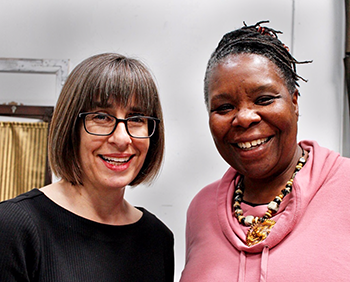Dramaturgs Shelley Orr and Kimberly King on their Work Behind Lynn Nottage’s "Sweat"

On April 18th, the San Diego Repertory Theatre (a.k.a. the REP) opens its production of the Pulitzer Prize-winning play Sweat by Lynn Nottage. The production team of Sweat is a veritable “who’s who” of TTF faculty, students, and alumni—Professor Anne McMills is the lighting designer, assisted by graduate student Winston G. Limauge. Dr. Patrice Amon, a lecturer in TTF, is the assistant director, and Professor Shelley Orr and Kimberly King, an alum of SDSU’s Theatre M.A. program, serve as co-dramaturgs. This article takes a closer look at the role of the dramaturgs in this production.
For those unfamiliar with Sweat, a play set in Reading, Pennsylvania, the REP’s website provides this synopsis: “With humor and tremendous heart, this Pulitzer Prize-winning drama is a story of a group of close friends who share everything. When layoffs shake up the factory where they work, the fragile bonds begin to splinter and the neighborhood bar turns into a battleground.”
The term “dramaturg,” very common in the European theatre tradition, is fast gaining currency here in the United States. In San Diego, the growing presence of dramaturgs in theatres across the city is due in no small part to the focus on dramaturgy in the M.A. in Theatre Arts program here at SDSU, spearheaded by Professor Orr. Because of its relative newness to the American theatre tradition, I asked Professor Orr and Ms. King to define dramaturgy for those not familiar with the term. “Very broadly,” says Ms. King, “the dramaturg is there to ask the questions that require everyone to go DEEP to answer. We do the critical thinking around the play and ask, Why this play, here, now? We are the ‘big picture’ people.” Professor Orr adds to this, saying “The dramaturg researches and gathers information that is tailored to the needs of the company and the specific direction in which the production is taking the play. The dramaturg is helpful during rehearsal as another set of eyes on the world of the play as it is being created.” Additionally, dramaturgs often facilitate discussions with the audience or other artists about the play (patrons can attend discussions with Professor Orr before the shows on April 20th and 27th). In short, the dramaturg provides a production team with strong foundational knowledge on which to base their creative decisions, and then acts as a critical eye during the development of that production. According to Professor Orr, a crucial way a dramaturg achieves the latter is by learning how to ask constructive questions, a skill she teaches her students in her seminar on Dramaturgy at SDSU.
As Ms. King and Professor Orr practice it, dramaturgy is an essential part of the artistic process. According to Professor Orr, “I absolutely consider myself part of the creative team. I think of dramaturgs as artists.” Aside from collaborating with the director on the development of the play in rehearsal, the creative part of dramaturgy also involves curating the contextual information that the dramaturgs gather and figuring out how to package it for presentation to different groups. The information required for actors, for example, is presented differently than that presented to the public. Audience members for Sweat will be able to enjoy the work of Ms. King and Professor Orr by reading their Curious REPort for the play. The REP regularly commissions dramaturgs to create these reports, which furnish patrons with relevant information specific to the themes, time period, and style of the show. The Curious REPort for Sweat is now available online.
A dramaturg’s exact role in a production changes somewhat depending on the show. I asked Ms. King and Professor Orr to explain what influenced their work for this particular production. Both artists, it turns out, have personal connections to this play in different ways. Ms. King notes “This piece has strong themes of Unionization and Racism, both of which I have had personal experience with as a woman of color and teacher in public education for 20+ years.” For Professor Orr, working on this production has meant seeing familiar sights with a new perspective: “Sweat is set in Reading, Pennsylvania, and my spouse grew up about an hour’s drive from the city. I have visited the area many times in the past twenty-five years and have a strong sense of it in that way. Because I grew up in another part of the U.S., it was interesting for me to visit the area with fresh eyes and note the regional idiosyncrasies. This background experience of the setting has informed every aspect of my work on the play.”
Like all theatre artists, dramaturgs hope the productions they serve will communicate strong messages to their audiences. For the dramaturgs working on Sweat, they are both concerned that the play’s complex social messages come to the fore. “The issues the play addresses include: working in industrial settings, relationships among co-workers, the changes and reductions in ‘blue collar’ work opportunities in the past two decades, the opioid crisis, relationships among people of different racial backgrounds, and immigration,” explains Professor Orr. “I hope that the audience might take away a new perspective on the issues they may have seen reported in the news and have a more in-depth understanding of the problems that working people face.” Ms. King hopes that the play will humanize the issues that it treats: “It is integral that the audience realize the plight of the people in Sweat. I particularly want people to realize that without a clear ‘villain’ (for the most part), choosing sides in this play means prioritizing the needs and realities of one person, or group, over another. Excluding or ignoring the needs of another American is a slippery slope to a lot of problematic ‘-isms’!” Clearly, each feels passionately that the characters and their difficulties be perceived with empathy and compassion.
Lynn Nottage is a powerful playwright who doesn’t shy away from asking hard questions about the biggest issues of our time. Artists like Kimberly King and Shelley Orr add an essential element of analysis and context that helps ensure that Nottage’s work arrives on stage with all its contours and complexities in full view.

